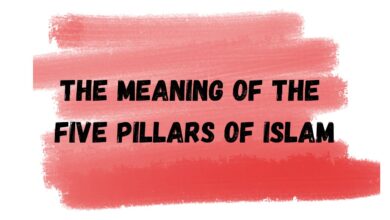Is it Haram to Swear or Threaten Someone? | Offensive Language | 2023
Upholding Ethical Values: The Forbidden Nature of Swearing and Threatening in Islam

Is it Haram to Swear or Threaten Someone?
Yes, swearing or using offensive language is considered Haram in Islam. Islam promotes respectful and kind communication that upholds the dignity and rights of individuals.

Introduction
In Islam, a religion that emphasizes ethical conduct and moral uprightness, the way individuals interact with one another holds profound significance. The teachings of Islam promote respect, compassion, and peaceful coexistence among people. When it comes to matters of speech and behavior, the religion places a strong emphasis on upholding the dignity and rights of others. This article delves into the concept of swearing and threatening in Islam, discussing why these actions are considered Haram (forbidden) and exploring the broader ethical principles that underpin this prohibition.
The Essence of Respectful Communication
Islam encourages believers to communicate in a manner that reflects respect and kindness towards others. The Quran, the holy book of Islam, emphasizes the importance of using words that are both truthful and gentle. In Surah Al-Isra (17:53), it is stated: “And tell My servants to say that which is best. Indeed, Satan induces [dissension] among them. Indeed Satan is ever, to mankind, a clear enemy.”
Using offensive language, swearing, or resorting to threats deviates from the ideal of respectful communication that Islam promotes. These behaviors not only undermine the harmony of human relationships but also contradict the fundamental principles of empathy and compassion upon which Islam is built.
The Prohibition of Swearing
Swearing, also known as using profanity or foul language, is strictly prohibited in Islam. The Prophet Muhammad (peace be upon him) emphasized the importance of guarding one’s speech. He stated, “A believer is not one who eats his fill while his neighbor is hungry” (Bukhari). This saying extends to the realm of speech as well; using harsh language while others are offended or hurt is antithetical to the teachings of Islam.
Swearing can lead to the degradation of human dignity and can incite discord and hostility among people. Islam encourages believers to build a society founded on cooperation, mutual understanding, and compassion. Engaging in vulgar or offensive language hinders the creation of such an environment.
Is it Haram to Swear or Threaten Someone?
Yes, swearing or using offensive language is considered Haram in Islam. Islam promotes respectful and kind communication that upholds the dignity and rights of individuals.
Why does Islam prohibit swearing?
Islam prohibits swearing because it goes against the principles of respectful and compassionate communication. Swearing can degrade human dignity, incite discord, and disrupt the harmony that Islam seeks to establish among people.
How does the Quran address the use of offensive language?
The Quran emphasizes using words that are best and gentle, and it discourages harmful speech. The teachings of the Quran encourage believers to speak truthfully and kindly to foster understanding and harmony.
Are there any Hadiths (sayings of Prophet Muhammad) about swearing?
Yes, Prophet Muhammad (peace be upon him) emphasized the importance of guarding one’s speech. He advised believers to refrain from using offensive language and to treat others with kindness and respect.
Is threatening someone forbidden in Islam?
Yes, threatening someone is considered Haram in Islam. Islam promotes peaceful coexistence and forbids behavior that creates fear, anxiety, and insecurity in others.
How does Islam promote compassion in communication?
Islam teaches believers to show kindness, mercy, and empathy in their interactions. Respectful and compassionate communication is essential for building strong relationships and fostering a harmonious society.
The Impact of Threatening Behavior
Threatening someone is another grave transgression in Islam. The Prophet Muhammad (peace be upon him) is reported to have said, “Do not harm or return harm.” This concise yet profound statement encompasses the core principle of avoiding harm in all its forms, including threats. Threatening behavior fosters fear, anxiety, and a sense of insecurity within individuals and communities, disrupting the tranquility that Islam seeks to establish.
Islam emphasizes that Muslims are to be ambassadors of peace, spreading goodwill and understanding. Threatening others contradicts this principle and disrupts the harmonious coexistence that Islam seeks to foster among diverse communities.
Ethical Principles Underpinning the Prohibition
The prohibition of swearing and threatening is deeply rooted in several ethical principles that Islam holds dear:
- Respect for Human Dignity: Islam teaches that every human being possesses inherent dignity and is deserving of respect. Swearing or threatening undermines this dignity and goes against the concept of honoring the sanctity of life.
- Kindness and Mercy: The Quran frequently underscores the importance of kindness and mercy towards fellow human beings. Swearing and threatening are actions devoid of kindness, mercy, and empathy.
- Justice and Equity: Islam places great emphasis on justice and equitable treatment of all individuals. Swearing and threatening infringe upon the rights of others and disrupt the just balance that Islam seeks to establish.
- Building Strong Relationships: Islam encourages believers to foster strong and positive relationships with others. Engaging in abusive language or threatening behavior weakens the bonds of trust and understanding necessary for healthy relationships.
Conclusion
In the light of Islamic teachings, swearing and threatening are unequivocally considered Haram due to their destructive impact on individual well-being, relationships, and society as a whole. Islam promotes speech that uplifts, inspires, and builds bridges among people. By adhering to the ethical principles of respect, compassion, and justice, Muslims can contribute to a world characterized by understanding, harmony, and mutual respect, as envisioned by the teachings of Islam.
Can anger justify swearing or threatening in Islam?.
No, even in moments of anger, Islam encourages believers to control their emotions and speak in a measured and respectful manner. Anger is not an excuse for using offensive language or threatening behavior.
How does Islam view the concept of human dignity?
Islam holds that every individual possesses inherent dignity and is deserving of respect. Swearing or threatening undermines this dignity and contradicts the ethical principles of Islam.
Are there any exceptions where swearing or threatening might be permissible?
Generally, Islam prohibits swearing and threatening regardless of the circumstances. However, there may be exceptional cases, such as self-defense, where measured actions might be justified, but even then, offensive language should be avoided.
What is the ultimate goal of prohibiting swearing and threatening in Islam?
The ultimate goal is to establish a society built on justice, compassion, and mutual respect. By adhering to the prohibition of swearing and threatening, believers contribute to creating an environment that embodies Islamic values of peace and harmony.
How can Muslims cultivate better communication skills in accordance with Islamic teachings?
Muslims can cultivate better communication skills by seeking knowledge about Islamic ethics, practicing self-awareness and emotional control, and consistently striving to treat others with respect, empathy, and kindness.
What is the role of personal accountability in adhering to these prohibitions?
Personal accountability is crucial. Muslims are responsible for their words and actions. Being conscious of the impact of words and refraining from harmful speech aligns with the teachings of Islam and contributes to a positive social atmosphere.





